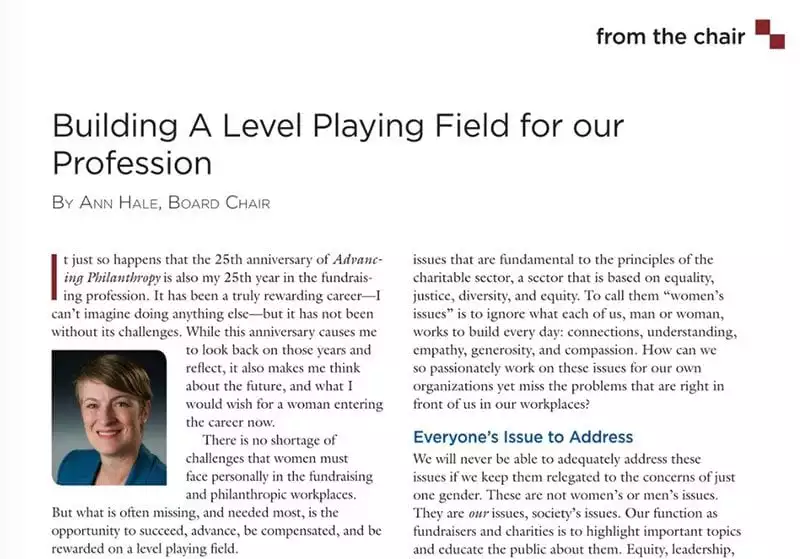AFP says charities must serve as a model in tackling sexual harassment and gender equity
The Association of Fundraising Professionals has issued a statement confirming its commitment to tackling sexual harassment and achieving gender equity in the fundraising profession. It also confirmed that it sees a role for charities in trying to lead the way on these issues.
“We can serve as a model – and given our role in society, we MUST serve as a model”, argue Ann Hale, the AFP’s Chair, and Mike Geiger, its President and CEO in their joint statement.
The organisation issued its statement Regarding Sexual Harassment/Gender Equity in the Fundraising Profession in response to the revelations about the recent Presidents Club fundraising dinner in London.
The AFP leaders strongly reject the notion that the event was “so extreme, so far out of the norm for the nonprofit sector” that “there are no lessons to be learned”. They argue: “nothing could be further from the truth”.
They further reject any suggestion that the charitable sector, because of its assumed shared values of “justice, equality, equity and respect” is somehow immune from sexual harassment and unequal treatment and pay for all.
The AFP has nearly 34,000 individual and organisational members, and is affiliated with the UK’s Institute of Fundraising (members receive the AFP newsletter).
Harassment by charity staff and donors
The professional organisation has published details of surveys on harassment of and by charity staff, and by donors, most recently in the Autumn 2017 issue of its magazine Advancing Philanthropy.
The leaders stated: “While the issue of donors harassing nonprofit staff and volunteers may be unique to our sector, the power dynamics are the same—and there are countless instances of it across the sector. In addition, harassment from supervisors, board members, and even co-workers occurs in the charitable sector with regularity.”
The Chair devoted her column to the topic in the Winter 2017 issue of Advancing Philanthropy.
AFP’s approach
In explaining AFP’s priorities in tackling these issues, its two leaders highlighted the role of its Code of Ethical Standards. This includes each fundraiser’s aspiration to “practice their profession with integrity, honesty, truthfulness and adherence to the absolute obligation to safeguard the public trust,” and to “foster cultural diversity and pluralistic values and treat all people with dignity and respect.”
Hale and Geiger add that their aims are:
Advertisement
- We must enact a clear and decisive policy of zero tolerance for harassment.
- Our goal is to build a culture of respect, equality, and openness so that harassment doesn’t occur—and if it does, victims must feel secure and confident that they can approach their supervisor and/or others in the organisation and expect an appropriate response while their confidentiality is respected.
- We need to proclaim loudly to our organisational leaders that no donation (and no donor) is worth taking away an individual’s respect and self-worth while turning a blind eye to harassment.
They say that, in addition to these policies and procedures, “we also must make clear upfront the expectations for behaviour from sector employees, board members, and yes, even donors [sic]. This must happen through education and continuous reinforcement of these critical principles.”
Equity
They recognise that “the issue of harassment is part of a larger conversation about equity in the fundraising profession and the charitable sector.”
As in the UK, there are many more women in the fundraising profession than men, but not at senior leadership positions.
“Women make up approximately 70 percent of the profession, yet account for only 30 percent of senior leadership positions. On average, women’s salaries lag behind their male counterparts by roughly US $12,000 – $20,000, according to AFP’s annual 2017 Compensation and Benefits Survey”.
They added: “having more female senior-level executives in the profession isn’t just important to preventing sexual harassment; it’s critical to furthering the entire mission of the nonprofit sector.”
Role of men in preventing harassment
The leaders make a third point in the statement: “we must emphasize, more than ever, the role of men in preventing harassment. It’s not enough for men to shake their heads at an incident like the Presidents Club and promise not to be “that guy.” Men and women need to be working together for this cause, and men need to take the initiative to speak out against harassment. Speaking out affirms that men are standing with their female colleagues and providing their unwavering support.”
AFP’s work in this area includes a partnership with The Chronicle of Philanthropy in which it will be conducting a survey about the prevalence of sexual harassment in the profession, “and then using that data to develop anti-sexual harassment education as part of our library of educational offerings”.
The organisation will make this training “available to AFP members and non-members alike”.
Furthermore, AFP will also be launching new initiatives later this year to address equity in the profession.
Hale and Geiger’s statement concludes: “We must bring our fundraising skills, innovation, empathy, and communications to this critical issue that affects our profession, our communities and the entire world. AFP is committed to this endeavour, and we encourage all organisations in the sector to join us as we work to champion equity, fairness, and justice in our own workplaces.”
The statement is available in Spanish and French.
Main image: Equal – carved letters. Photo: Scott (archxs) on Flickr.com




